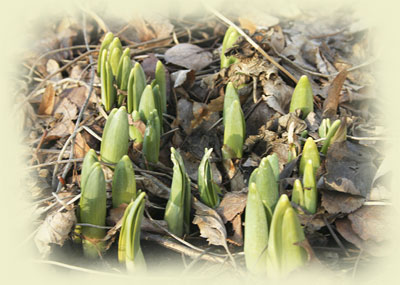If the Holy Bible is to be believed, we must view God's creatures as gifts to his favored children and use them for our own purposes, even if this occasionally causes this one or that one to go extinct after a while ... If one species or another of those muddly little salamanders were extinct, who would care anyway?
(Written in a note from Garnett to Nannie in Barbara Kingsolver's Prodigal Summer)
It seems odd to mention the same high school course twice in two days for two different reasons, especially when I have never had cause to mention it before. However, in that global issues course, one of the units of study dealt with environmental issues. On two separate occasions I took students to a university day conference that focused on world issues. Although it was a conference for students, as a teacher I too learned.
One session that I attended was led by a professor from the philosophy department. His main thesis was to the effect that the Judeo-Christian (the professor's term) construct is antithetical to environmentalism. His point: deep in the Judeo-Christian mind set is the conviction that everything else in nature was put here for us to use at our convenience.
... God said unto them, Be fruitful, and multiply, and replenish the earth, and subdue it: and have dominion over the fish of the sea, and over the fowl of the air, and over every living thing that moveth upon the earth. (Genesis 1:28 KJV, emphasis mine)
In my head, I argued with the man. In the classroom, students tried their best to offer logical counter arguments, but he was not to be swayed. He was, in effect, saying that our culture must shift to a world view other than the Christian one if we were to save the planet. As one steeped in Christian tradition who also thought himself as an environmentalist of sorts, I felt that I was proof enough that environmentalism and Christianity need not be mutually exclusive, for at the very least, even though I am not prone to discard my vehicle or to attempt to live without electricity, I have sympathy for the cause and what I believe to be fairly high levels of environmental awareness and sensitivity.
I knew, or thought that I knew, that my own belief structure gave the lie to his position. Of course, I knew, or thought that I knew, that other Christians likewise eschewed the rapacious attitude of which he accused all Christendom. Therefore, I set his argument aside and have thought little of it — until yesterday.
However, yesterday, in response to my Bubba the Lobster blog, one commenter (whom I am not trying to put down) offered the following: "We have to realize, though, that God made humans this way. We are supposed to eat other animals." I don't quibble with those particular words exactly but with the implied contention (and perhaps I misinterpret, so please don't flame me too badly) that it is our human right to do as we please with all that there is in the natural environment. (Read the complete blog and comments here.)
This is indeed a very different view of the world than the one that I encountered when we went on a whale-watching excursion on a little fishing boat off Cape Breton Island, Nova Scotia. The captain explained that he also trapped lobsters during the appropriate season. Then, at the end of each lobster season, Buddhists from the local monastery would purchase the whole of his final catch. They would then have him take them and the lobsters out to the sea where they would release the crustaceans, "to give them another chance at life." (Click here to read more about that day and to see a few photos .)
In light of my memories, of my recollection of that philosophy workshop, of comments made to the blog, and of further reflection, I now feel compelled to re-examine the question. I doubt that my puny brain will be able to arrive at the ultimate answer, but I shall offer some thoughts and offer readers the opportunity to share their own wisdom and perceptions.
Based on the creation account, even if one must take it literally as many do, I think that I have the ammunition to refute the professor. I think that I can make the case that the Judeo-Christian world view can be compatible with Environmentalism, that Christians must not necessarily be forced to agree with the fictional Garnett or with the one who commented on yesterday's blog.
I take this view because God said what he did (in Genesis 1:28, above) within the context of the Garden of Eden. As I understand the concept, the Garden of Eden was not a typical, cultivated garden. Rather, it was a kind of utopia where they cultivated nothing and killed nothing. They merely gathered sufficient from its abundance to satisfy their scanty needs. They lived in harmony with it. Eden was paradise on earth. There was no cultivating, no killing, no ravaging, no despoiling, no deforestation, no depleting of resources, no ruination of habitats, no extinction of species, no emitting of noxious gases, no servitude to greed, and no wanton exploitation.
Genesis 1:29,30 from the NIV further clarifies the meaning of the previously quoted verse for God clearly indicates that he was speaking about both humans and animals eating of the abundant plant matter that He had provided:
Then God said, "I give you every seed-bearing plant on the face of the whole earth and every tree that has fruit with seed in it. They will be yours for food. And to all the beasts of the earth and all the birds of the air and all the creatures that move on the ground — everything that has the breath of life in it — I give every green plant for food." And it was so.
The real problem with the Judeo-Christian account is not the original covenant in Eden, however, but the revised covenant given to Noah in Genesis 9:2,3 after the flood:
The fear and dread of you will fall upon all the beasts of the earth and all the birds of the air, upon every creature that moves along the ground, and upon the fish of the sea; they are given into your hands. Everything that lives and moves will be food for you. Just as I gave you the green plants, I now give you everything.
That just about sums it up doesn't it? It gives us to understand the West's historical and even current attitude towards the earth. With those words, the creator imparts to us god-like power and almost prophesies how we will use it: to take what we want, how we want, in a way that will cause every other creature to cower before us. It has pretty well worked out that way, hasn't it?
No wonder the professor sees no hope for the environment as long as the Judeo-Christian view prevails, for, historically, it seems as though Christians have interpreted God's covenant with Noah in the most extremely literal and environmentally harmful way possible.
It is now up to Christians to reevaluate. Is the concept of stewardship not to be factored into this dogma at some point? When God gave us everything, he seems to have meant it. However, it also seems to me that it is up to the owner of a gift to use it wisely or unwisely. For example: if I were to win the lottery today (please God!), I could fly to Las Vegas tonight and blow all of the money by morning. Or I could invest some, donate some, and use some for modest extravagances. In other words, I could choose to honour and value the gift or treat it with contemptuous carelessness.
We must question whether it is ethical for humans to use God's gift to depredate and despoil the earth and to show no concern or respect for all of the other living beings that God created. We clearly have the power, and, just as clearly, we have been abusing that power. Is God not concerned with the rest of his creation? According to Luke 12:6 (NLT), He cares for all of creation, for Jesus said: "What is the price of five sparrows? A couple of pennies? Yet God does not forget a single one of them."
I contend that we have desecrated God's gift to us by devaluing it and by treating His magnificent creation with disdain. We have chosen to claim our legal rights to do with the earth as we will, but we have not chosen to follow the true desire of a God who created all and loves all of his creation. We have chosen to pillage rather than shepherd. We have chosen to use God's gift in a way that places little value and respect on the rest of His creation.
Is the philosopher correct? Judging by our past deeds, most definitely. However, I find the fault to be in how we have chosen to oversee the gift, how we have chosen to place little value on the rest of God's magnificent creation. With hardened and faithless hearts we use the bible to justify what I hold to be ungodly attitudes and actions.
Not every one that saith unto me, Lord, Lord, shall enter into the kingdom of heaven ... then will I profess unto them, I never knew you: depart from me, ye that work iniquity. (Matthew 7:21-23)
And so, I have gone round and round and driven myself crazy by altering and readjusting my thoughts and probably making a mishmash of it all. On one hand, I see the philosopher as being correct: the traditional Judeo-Christian interpretation has not been friendly to the earth. However, I contend that the traditional interpretation has been flawed and incorrect from the beginning and that a theologically correct analysis will uncover the notion that there need be little conflict between Christianity and Environmentalism.
Let me conclude these chaotic and whirling thoughts by quoting Nannie's answer to Garnett in Prodigal Summer.
If God gave Man all the creatures of this earth to use for his own ends, he also counseled that gluttony is a sin — and he did say, flat out, "Thou shalt not kill." He didn't tell us to go ahead and murder every beetle or caterpillar ...











